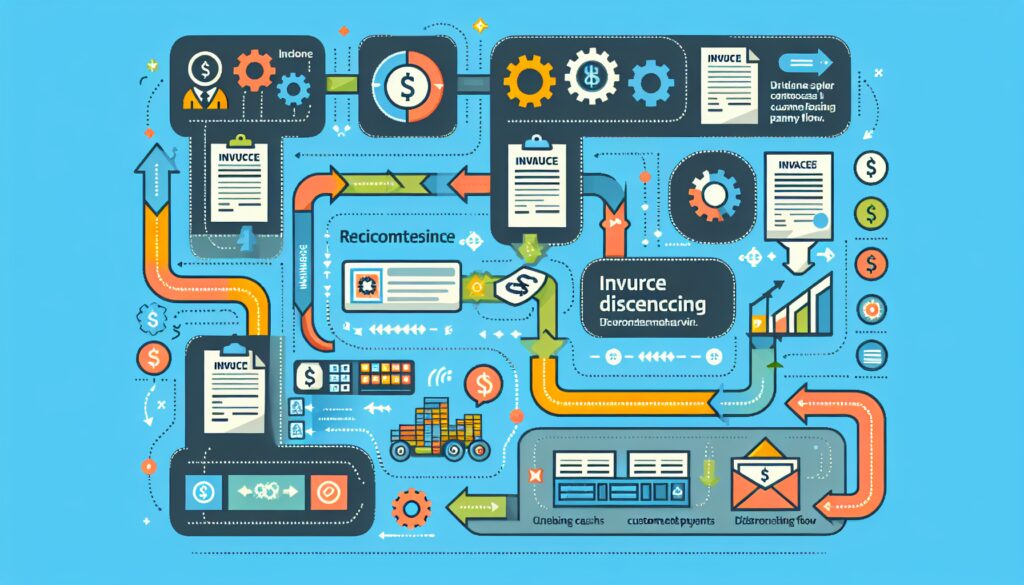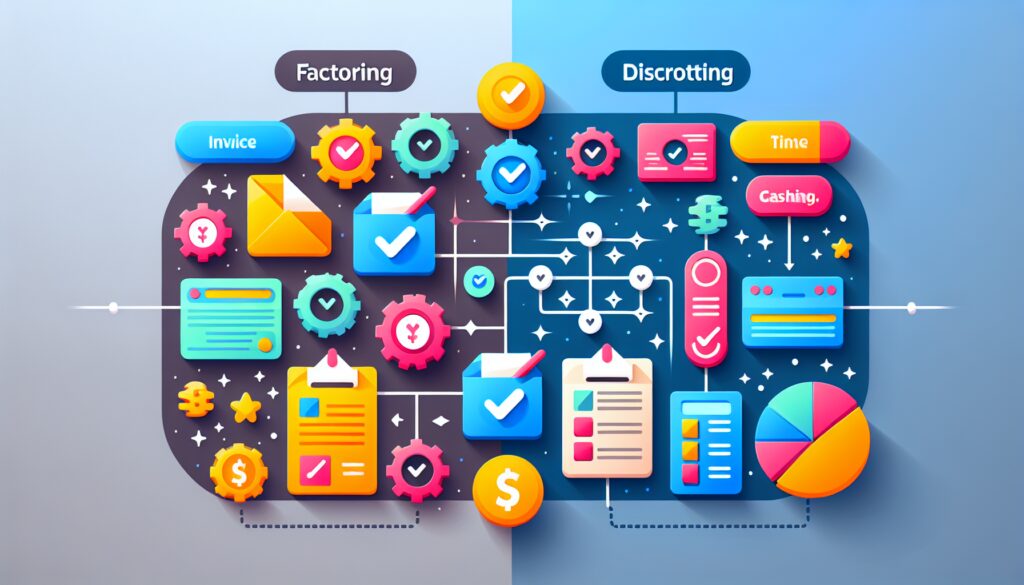Invoice Discounting vs Invoice Factoring
Understanding factoring and discounting is crucial if you’re wondering how to manage cash flow and access funds tied up in overdue invoices. Factoring involves selling your invoices to a third party for instant cash, while discounting allows you to borrow against your unpaid invoices.
Both methods offer unique benefits but serve the same purpose: improving your immediate cash flow. In this article, we’ll explore factoring discounting, how each method works, their fundamental differences, and the advantages they offer your business.
Key Takeaways
- Invoice factoring provides immediate cash flow by selling outstanding invoices to a factoring company. In contrast, invoice discounting or invoice financing allows businesses to access funds by borrowing against unpaid invoices while retaining control over collections.
- Factoring companies manage customer collections for businesses, which can affect customer relationships, whereas invoice discounting allows businesses to maintain customer interactions privately.
- Choosing between factoring and discounting depends on the size of the business and its customer relationships. Larger companies often favor discounting because of its lower costs, while smaller companies benefit from factoring’s accessibility and their need for a third party to manage credit and collections.
What is Factoring Discounting?

Invoice factoring is the process of selling unpaid invoices to a factoring company at a reduced cost. It immediately boosts cash flow without creating debt, allowing businesses to turn their accounts receivable into upfront capital by receiving part of the invoice value from an intermediary.
Alternatively, invoice discounting permits companies to control their collections while securing funds against outstanding invoices. Both techniques are designed to enhance cash flow and grant rapid access to money essential for covering operational expenses and fostering growth.
Factoring and invoice discounting—while aiming for similar outcomes in improving business liquidity—differ in execution, each presenting distinct advantages and potential drawbacks.
How Invoice Factoring Works

Invoice factoring involves a business selling its unpaid invoices to a third-party entity, commonly called the factoring company, in exchange for immediate liquidity. The essential steps include locating a suitable factoring provider, forwarding the relevant invoices for consideration, and obtaining cash advances against those submitted documents.
These critical stages are integral to enabling businesses to secure necessary funding well ahead of their customer payment due dates.
Finding a Factoring Provider
Businesses must carefully select a suitable factoring provider when considering invoice factoring as an option. The advantage of partnering with a factoring company lies in the more lenient qualification criteria compared to those associated with traditional loans, simplifying the process for companies seeking eligibility.
During the factoring company selection process, firms should assess the agreement conditions provided by these services, verify that payment schedules are compatible with their financial demands, and consider any unique needs they may have.
To secure an economical choice that supports their cash flow requirements without leading to additional expenses, businesses ought to weigh up the offerings and fees from various providers. This comparison allows them to determine the most cost-effective type of invoice factoring explicitly tailored to their situation.
Submitting Invoices to be Funded
Businesses forward copies of their invoices to the factor after finalizing a contract with a factoring company. This action kicks off the process, allowing the factoring provider to evaluate and authenticate these invoices and confirm that they align with all required standards.
Once the factoring transaction involving selling the invoices is complete, the factoring firm issues its invoice directly to the customer. Doing so simplifies and takes over the collection process from businesses, relieving them of payment pursuit duties and allowing them to concentrate on running their operations efficiently.
Receiving Advances
Invoice factoring provides a key benefit of allowing businesses to obtain a cash advance, usually between 70% and 90% of the invoice’s value. This grants companies immediate access to capital that can be used for day-to-day expenses or unexpected costs, helping them maintain adequate liquidity for smooth operations.
After the customer settles their invoice payment, the business receives the residual amount from the factoring company after deducting any prearranged fees. This concludes the transaction and ensures businesses receive the entire value they owe on their invoices while preserving a healthy cash flow.
How Invoice Discounting Works

Invoice discounting secures a loan by leveraging the value of outstanding invoices, enabling companies to promptly convert their unpaid invoices into cash. This approach provides businesses with a short-term loan while they continue managing their collections.
Critical steps include establishing an invoice discounting arrangement, overseeing customer payments, and managing repayment obligations and associated charges.
Setting Up an Invoice Discounting Agreement
Implementing an invoice discounting arrangement requires a business to present its invoices to a discounting company, with these outstanding invoices serving as security for financing. This financial mechanism empowers companies to secure loans against their accounts receivable, ensuring they gain immediate access to capital otherwise bound within unpaid invoices.
By utilizing their unpaid bills in this way, enterprises can unlock as much as 95% of the value of an invoice swiftly—often within just a few days. Establishing such a process is crucial for businesses needing to enhance their cash flow situation.
Managing Customer Payments
With invoice discounting, companies gain the advantage of instant cash flow while overseeing customer payments. These businesses must secure prompt payment collection from customers to sustain financial health.
By controlling the collection process, companies can nurture robust relationships with their customers and competently manage their sales ledgers. This aspect of invoice discounting enables firms to conduct interactions with customers discreetly without disclosing details about their funding methods.
Repayment and Fees
Costs and reimbursement are pivotal elements of invoice discounting. Fees fall between 1% and 3% of the comprehensive invoice sum, subject to variation by the service provider. These fluctuating costs can influence the total expense incurred by enterprises. Thus, they should be considered during the establishment of an invoice discounting arrangement.
The repayment mechanism requires companies to return the amount received from discounts upon collecting customer payments, plus any relevant charges. Understanding these monetary commitments is essential for managing cash flow adeptly when engaging in invoice discounting practices.
Key Differences Between Invoice Factoring and Discounting

Factoring and discounting, while similar, have key differences that businesses must understand. In invoice factoring, the factoring company manages customer collections, which can impact customer relationships and perceptions. Factoring often includes credit control services, freeing up time for businesses.
On the other hand, invoice discounting allows businesses to retain control over their customer relationships and maintain confidentiality, as customers are unaware of the financing process.
The risk management aspect also differs; in non-recourse factoring, the factoring company assumes the risk, whereas in invoice discounting, the business must repay the loan regardless of customer payment.
Benefits of Invoice Factoring

Invoice factoring is a valuable financial tool, especially for small businesses that need to transform their unpaid invoices into instant cash. This strategy enhances cash flow, allowing enterprises to handle ongoing costs efficiently and seize opportunities for expansion across different sectors by quickly improving liquidity.
Recourse and non-recourse options in invoice factoring assist companies in safeguarding customer relationships by delegating collection tasks. Non-recourse factoring provides explicit protection against bad debt (the bankruptcy of your customers), and the responsibility for any unpaid receivables shifts to the factoring company. Such protection is vital for firms navigating unpredictable economic conditions.
Benefits of Invoice Discounting
The primary objective of invoice discounting is to enhance cash flow and working capital by liberating funds tied up in invoices. This approach enables businesses to swiftly gather customer payments while preserving robust relationships, as the financing arrangements remain undisclosed.
Confidential invoice discounting permits companies to access essential funding without compromising customer trust by keeping their financial agreements under wraps. The advantage of confidentiality is especially beneficial for enterprises that place a high premium on discretion within their financial dealings.
Risks and Considerations
Invoice discounting and factoring carry inherent risks that must be carefully weighed. If customers delay or default on their payments, unpaid invoices can significantly disrupt a business’s cash flow.
When dealing with factoring companies, businesses might incur increased costs due to fees that accrue over time as they await customer payment for their invoices. Invoice discounting or relinquishing control over one’s sales ledger can be dangerous and may lead to complications in managing debts.
Choosing the Right Option for Your Business
Choosing between factoring and discounting depends on factors such as business size, turnover, and customer relationships. Larger companies with stable customer relationships and higher turnover prefer invoice discounting due to its lower cost. Smaller companies, on the other hand, often find invoice factoring more accessible.
Invoice factoring is ideal when a bank line of credit or A/R financing is unavailable or inadequate. It allows businesses to offer flexible payment terms to clients, reducing pressure on cash flow and enabling growth. An invoice factoring company can provide the necessary support in these situations.
Case Studies and Examples
Examples from real-world scenarios show the tangible advantages of invoice factoring and discounting. For example, tech startups frequently utilize invoice factoring to quickly transform unpaid invoices into cash at hand, allowing them to funnel investments into development and marketing efforts without experiencing monetary pressure.
Within the manufacturing sector, enterprises opt for non-recourse factoring to minimize financial risk while securing immediate funding necessary for production demands. These instances reveal how factoring and discounting can offer firms swift access to cash flow, which is crucial for sustaining business activity and fostering expansion.
Please read additional factoring case studies on our blog.
Summary
Overall, invoice factoring and discounting are powerful tools for managing cash flow. Factoring involves selling invoices to an invoice factoring company, like Bankers Factoring, while discounting allows businesses to borrow against their unpaid invoices. Each method has unique benefits and considerations, making them suitable for different business needs.
Understanding each option’s key differences and benefits can help businesses make informed decisions. Whether you choose factoring for immediate cash flow or discounting for confidentiality, these financing options can significantly impact your business’s financial health and growth potential.
Frequently Asked Questions
What is invoice factoring?
Invoice factoring is the process of selling outstanding invoices to a factoring company at a discounted rate. This allows businesses to receive immediate cash flow, which can help improve liquidity and support ongoing operations. You should understand the cost of factoring and the factoring company’s reserve policy.
Please read our article on offsetting the cost of factoring.
What is the primary difference between invoice factoring and invoice discounting?
The primary difference between invoice factoring and invoice discounting is that the factoring company handles collections, whereas in discounting, the business retains control over its collections.
What are the benefits of invoice factoring for small businesses?
Invoice factoring enhances cash flow, streamlines accounts receivable management, and offers protection against bad debts, making it a valuable financial tool for small businesses.
How quickly can businesses access funds through invoice discounting?
Through invoice discounting, companies can swiftly obtain as much as 95% of the value of an invoice within a short span of days to meet urgent cash flow requirements.
What are the risks associated with invoice discounting?
Invoice discounting can lead to financial instability if customers delay payments, and it may result in a loss of control over the sales ledger. Is your company good at checking credit reports, collecting receivables, and processing invoice payments? If you choose invoice finance, it is essential to carefully manage these risks to maintain cash flow and business integrity.
